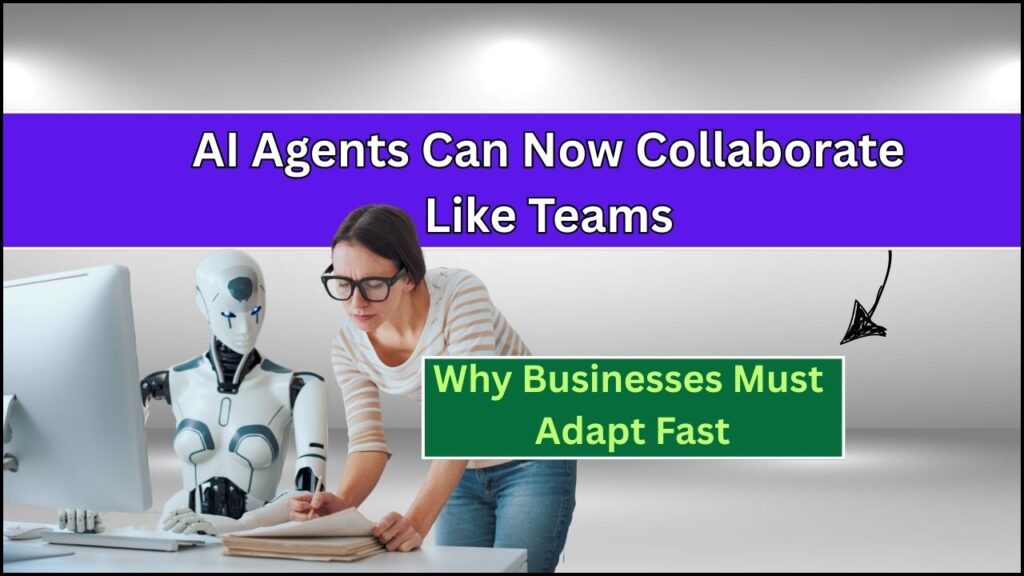AI Agents Can Now Collaborate Like Teams: In today’s fast-moving digital world, AI agents that collaborate like human teams are not science fiction anymore — they’re real, and they’re transforming businesses at lightning speed. From large corporations to startups, companies are deploying intelligent agents that communicate, plan, and solve problems together, just like a well-oiled human team.

While the idea might sound futuristic, it’s already in action. Think of AI agents not as individual chatbots but as a group of smart tools that work together, learning, adapting, and delivering solutions in real time. Whether you’re in consulting, finance, retail, or software, the age of collaborative AI is here — and it’s changing the rules of the game.
AI Agents Can Now Collaborate Like Teams
| Feature | Details |
|---|---|
| Topic | AI Agents Collaborating Like Human Teams |
| Main Benefit | Boosts productivity, efficiency, and innovation across industries |
| Industries Impacted | Consulting, Finance, Software, E-commerce, Healthcare |
| Popular Tools | McKinsey Lilli, BCG GENE, Salesforce Einstein, Visa Intelligent Commerce |
| Productivity Gain | Up to 137% improvement in team communication |
| Official Resource | Confiz on AI Collaboration |
AI agents that collaborate like human teams are not just a passing trend — they are the next frontier in business innovation. Whether you’re in consulting, finance, or operations, adapting to this shift will help you boost productivity, reduce costs, and outpace your competition. The companies that embrace this change early will be the ones leading tomorrow’s markets.
What Are AI Agents and Why Are They Important?
AI agents are smart digital tools designed to do tasks on their own, make decisions, and even learn from what they do. Now, imagine a team of these agents working together. That’s where the magic happens. Instead of one tool answering a question or filling out a form, you get several AI agents sharing tasks, solving complex problems, and improving results over time.
For example, instead of having one AI write a report, another AI might gather the data, a third AI could analyze trends, and a fourth could format and deliver it to the client. It’s like having a digital team of interns and analysts working around the clock.
Real-World Use Cases: AI Teams in Action
Consulting Firms
- McKinsey’s Lilli is a generative AI chatbot used by over 70% of employees. It accesses a century’s worth of firm knowledge to answer questions and speed up research.
- BCG’s GENE and Deckster help consultants write reports, generate slides, and provide instant guidance based on client data.
- Deloitte uses AI tools like Sidekick and Zora AI to generate documents, structure engagements, and accelerate workflows.
Financial Services
- Visa Intelligent Commerce leverages AI agents to automate checkout processes, improving customer convenience and reducing cart abandonment.
- Agents collaborate across inventory checks, price comparisons, fraud detection, and personalized suggestions.
Enterprise Software
- Salesforce Einstein integrates with customer data to send follow-up emails, generate sales reports, and support customer queries without human input.
- Microsoft Copilot and Oracle AI Agents are redefining CRM by turning interactions into strategic insights.
Why Businesses Need to Adapt Fast
The shift toward AI agent collaboration is not optional. Companies that delay risk falling behind more agile competitors.
Key Reasons to Act Now:
- Higher Productivity: Studies show teams using AI agents increased communication by 137% and had more creative outputs.
- Reduced Costs: Automating repetitive tasks can save thousands of employee hours annually.
- Faster Decision-Making: AI agents can analyze and synthesize data faster than human teams.
- Scalability: As your business grows, AI teams grow with it, without the cost of onboarding new staff.
How to Get Started with AI Agent Collaboration
Step 1: Assess Your Needs
Start by identifying areas where decision-making or workflow is slow. Look at processes like onboarding, reporting, customer service, or analytics.
Step 2: Pick the Right AI Tools
Choose tools that integrate well with your existing systems. For example:
- For sales teams: Salesforce Einstein, HubSpot AI
- For consulting: ChatGPT Enterprise, GENE, Lilli
- For finance: Visa Intelligent Commerce, Stripe AI Assistants
Step 3: Train Your Teams
Don’t just deploy AI—educate your staff. They need to understand how AI agents work and how to communicate with them effectively.
Step 4: Start Small, Scale Fast
Begin with one department, track results, and expand based on ROI. Use pilot programs to iron out issues.
Step 5: Continuously Monitor and Improve
AI agents get better with feedback. Regularly update goals, review performance, and fine-tune prompts.
What Are AI Agents? Understanding the Next Evolution in AI Tools
Alibaba Unveils Qwen 3 AI Model as Chinese Tech Rivalry Heats Up
FAQs About AI Agents Can Now Collaborate Like Teams
Can AI agents really replace human teams?
No. They are designed to augment human teams, not replace them. They take on repetitive, data-heavy tasks, freeing humans for creative and strategic work.
Are AI agents safe to use in critical tasks?
Yes, if built and monitored properly. Choose tools with strong data security and compliance protocols.
Do I need coding skills to use AI agents?
Not necessarily. Many modern tools have user-friendly interfaces that don’t require technical expertise.
How much does it cost to implement AI agents?
Costs vary depending on scale and tools. Some platforms offer affordable packages for small businesses.
Will AI agents take jobs away?
They may replace certain roles, but they’ll also create new ones — like AI trainers, prompt engineers, and workflow managers.








